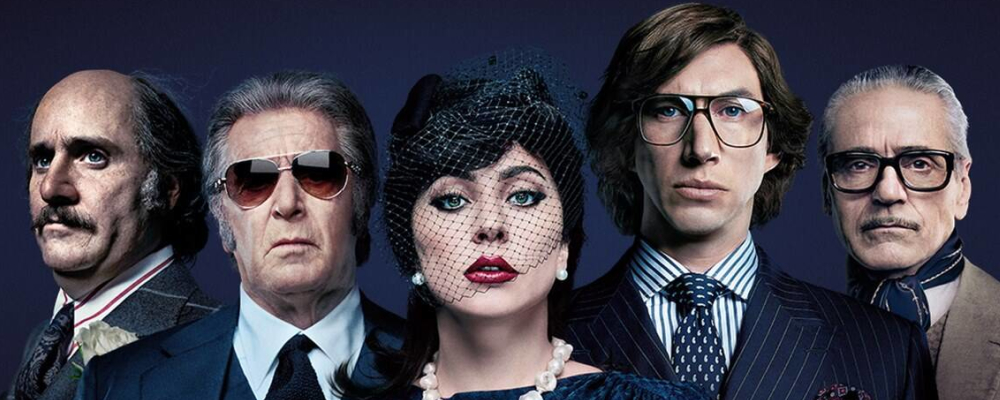Between House of Gucci and Christopher Pratt’s casting as Mario, it’s been a difficult time for Italians in cinema.
Ridley Scott’s second film this year after historical epic The Last Duel, House of Gucci is more in the vein of his 2017 effort All the Money in the World – a stylish crime drama based on a real-life event, though trading that film’s shadowy restraint for a smorgasbord of scenery chewing character work.
In 1995, Maurizio Gucci, then head of the Gucci fashion house, was shot and killed by assassins; much as Gianni Versace would be two years later. However, the cause behind Maurizio’s death lay much closer to home…
House of Gucci takes us back to 1978 where the ambitious, young Patricia Reggiani (Lady Gaga, dark-eyed and sly inscrutable; the bedrock of the whole film) is working in her father’s trucking business. One night, Patricia meets a handsome, unassuming stranger at a party, whose name she learns is Maurizio Gucci (Adam Driver, the only “straight man” of the bunch), and sets out to make him hers; despite the objections of his father Rodolfo (Jeremy Irons, looking like Gomez Addams with consumption, all cheekbones, pencil mustache and cigar holder).
Married into the family but still an outsider, Patricia ingratiates herself with the Gucci family patriarch Aldo (Al Pacino, playing it broad but with effortless gravitas); dragging a reluctant Maurizio back into the family business.
House of Gucci plays like The Godfather if Kay Corleone had been the driving force behind Michael’s rise to power.
As Aldo, Pacino has Don Corleone’s avuncularity, but none of his humility; his initial kindness concealing a matter-of-fact arrogance about his role in the family. In the Fredo role – that of of Paolo Gucci, black sheep of the family – Jared Leto seems, as always, to be competing for the Best Actor of All Time Award™. Flamboyant and pathetic in equal measure, masked beneath a bald cap and heavy prosthetics, he fawns and exclaims, uttering malapropisms in an Italian accent so ripe as to be cured. For so much performance, it makes remarkably little impression.
If The Last Duel came under criticism for its depiction of woman-as-victim, albeit a defiant one, House of Gucci casts its female lead as first empire builder then murderous instigator.
Becky Johnston and Roberto Bentivegna’s script showcases a real affection and sexual chemistry between Maurizio and Patricia in their early courtship, but this is corrupted by Patricia’s desire for control; even if it means destroying the rest of the whole Gucci family.
DoP Dariusz Wolski brings the impression of dimming beauty, pistine but faded, but Harry Gregson-Williams score is overshadowed by an assortment of Italia opera and pop hits, including an Italian cover of “I’m A Believer” and a marriage ceremony set to George Michael’s “Faith”.
House of Gucci has style and character, but sours over the course of it’s 157-minute runtime as the focus shifts to internecine squabbling, corporate intrigue, and, coming full circle, murder.
For all its style, the film’s elegance and ambition can’t overcome its lack of narrative payoff.
